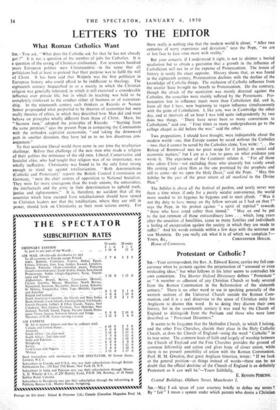LETTERS TO THE EDITOR
What Roman Catholics Want
SIR,—You ask, " What does the Catholic ask for that he has not already got ?" it is not a question of the number of jobs for Catholics. It is a question of the saving of Christian civilisation. For seventeen hundred years European politics were Christocentric—in the sense that all politicians had at least to pretend that their purpose was to fulfil the will of Christ. It has been said that Walpole was the first politician in European history who could afford to be indifferent to theology. The eighteenth century bequeathed to us a society in which the Christian religion was generally tolerated, in which it still exercised a considerable influence over private life, but in which its teaching was held to be completely irrelevant to the conduct either of business or of statesman- ship. In the nineteenth century such thinkers as Ricardo or Nassau Senior propounded what purported to be theories of economics but were really theories of ethics, in which they described how Man did and must behave on principles wholly different from those of Christ. Marx, his " Siamese twin," adopted the principles of Ricardo. " Starting from the same premises," says the present Pope in comparing the Communists with the orthodox capitalist economists, " and taking the downward path in another direction, they have led us to no less disastrous con- sequences."
To that secularist liberal world there came in our time the totalitarian challenge. Before that challenge of the new men who made a religion of their politics the resistance of the old men, Liberal, Conservative and Socialist alike, who had taught that religion was of no importance, was wholly ineffective. Christianity was found to be the only force strong enough to stand up against totalitarianism. " Both denominations (Catholic and Protestant)," reports the British Control Commission on Germany, " were the chief centres of opposition to National Socialism. They were far more courageous than the trade unions, the universities, the intellectuals and the army in their determination to uphold truth, justice and righteousness." It is, therefore, no accident that all the countries which have escaped from totalitarianism should have turned to Christian leaders nor that the totalitarians; where they are still in power, should look on Christianity as their most serious enemy. For there really is nothing else that the modern world is about. " After two centuries of sorry experience and deviation," says the Pope, " we are at last face to face once more with reality."
But your concern, if I understand it right, is not to disinter a buried secularism but to obtain a guarantee that a growth in the influence of Catholicism will not be at the expense of Protestantism. The lesson of history is surely the exact opposite. History shows that, as was found in the eighteenth century, Protestantism declines with the decline of the knowledge of Catholic things. The exclusion of Catholic influence from the secular State brought no benefit to Protestantism. On the contrary, though the attack of the secularists was mainly directed against the Catholics, the casualties were mainly suffered by the Protestants. Pro- testantism lost in influence much more than Catholicism did, and is, from all that 1 hear, now beginning to regain influence simultaneously with the gains of Catholicism. I, like you, was in Cambridge the other day, and at intervals of an hour I was told quite independently by two dons two things. "There have never been so many conversions to Catholicism," said one. " Four times as many undergraduates go to the college chapel as did before the war," said the other.
Two propositions, I should have thought, were indisputable about the modern world—one, that Europe cannot be saved without the Catholics —two, that it cannot be saved by the Catholics alone. You write: "... the Bishop of Brentwood sees no great scope for it [unity] in social and economic matters," but I am at a loss to guess on what evidence you wrote it. The experience of the Continent refutes it. " For all those who adore Christ—not excluding those who sincerely but vainly await His coming and adore Him as the one promised by the prophets and still to come—do we open the Holy Door," said the Pope.. " May this Jubilee be the year of the great return of all mankind to the Divine Plan."
The Jubilee is above all the festival of pardon, and surely never was there a time when, if only for a purely secular convenience, the world more needed to let bygones be bygones and to start afresh. " Was it not thy duty to have mercy on thy fellow servant as 1 had on thee ?" says the Pope, in his protest against " a spirit of reprisal " towards " those who have erred rather than sinned." " May an end be put to the last remnant of those extraordinary laws . . . which, long years after the cessation of hostilities, cause so many families and individuals a feeling of exasperation against the society in which they are made to suffer." And his words coincide within a few days with the sentence on von Manstein. Do you really ask what it is of which we complain ?—






































 Previous page
Previous page